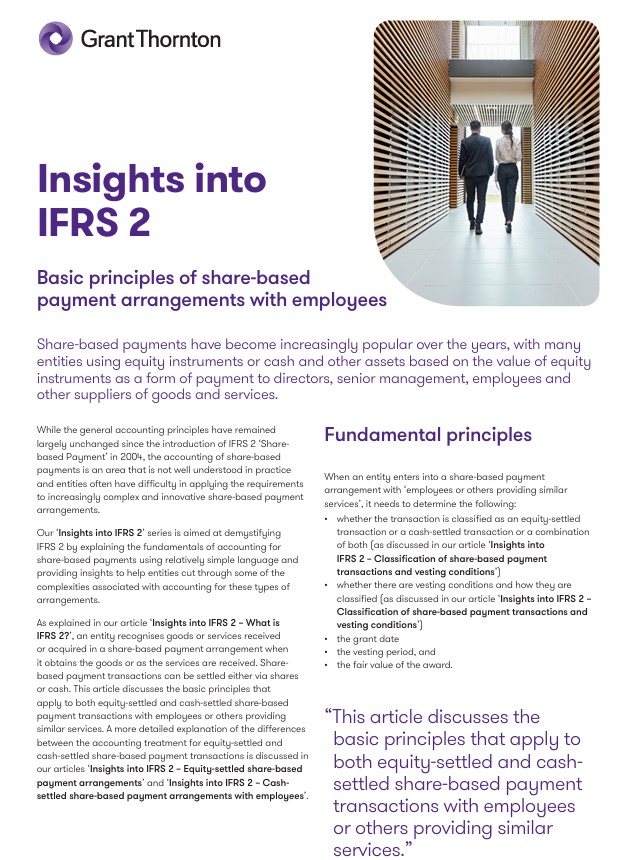
Share-based payments have become increasingly popular over the years, with many entities using equity instruments or cash and other assets based on the value of equity instruments as a form of payment to directors, senior management, employees and other suppliers of goods and services.
While the general accounting principles have remained largely unchanged since the introduction of IFRS 2 ‘Sharebased Payment’ in 2004, the accounting of share-based payments is an area that is not well understood in practice and entities often have difficulty in applying the requirements to increasingly complex and innovative share-based payment arrangements.
Our ‘Insights into IFRS 2’ series is aimed at demystifying IFRS 2 by explaining the fundamentals of accounting for share-based payments using relatively simple language and providing insights to help entities cut through some of the complexities associated with accounting for these types of arrangements.
As explained in What is IFRS 2?, an entity recognises goods or services received or acquired in a share-based payment arrangement when it obtains the goods or as the services are received. Sharebased payment transactions can be settled either via shares or cash.
A more detailed explanation of the differences between the accounting treatment for equity-settled and cash-settled share-based payment transactions is discussed in our Insights into IFRS 2 articles 'Equity-settled share-based payment arrangements’ and ‘Cash-settled share-based payment arrangements with employees’.
Fundamental principles
When an entity enters into a share-based payment arrangement with ‘employees or others providing similar services’, it needs to determine the following:
- whether the transaction is classified as an equity-settled transaction or a cash-settled transaction or a combination of both (as discussed in our article ‘Classification of share-based payment transactions and vesting conditions’)
- whether there are vesting conditions and how they are classified (as discussed in 'Classification of share-based payment transactions and vesting conditions’)
- the grant date
- the vesting period, and
- the fair value of the award.
Determining the grant date
Grant date:
The date at which the entity and another party (including an employee) agree to a share-based payment arrangement, being when the entity and the counterparty have a shared understanding of the terms and conditions of the arrangement. At grant date, the entity confers on the counterparty the right to cash, other assets, or equity instruments of the entity, provided the specified vesting conditions, if any, are met. If that agreement is subject to an approval process (for example, by shareholders), the grant date is the date when approval is obtained.
Determining the ‘grant date’ is important when a share-based payment transaction is between an entity and employees as it is the date at which the transaction is measured.
For share-based payment transactions with employees, the grant date is:
- Equity-settled share-based payments - The date on which the fair value of equity instruments granted is measured.
- Cash-settled share-based payments - The date on which the fair value of the liability is initially measured
There are two key components in this definition of 'grant date':
1. Both the entity and the employee are required to:
- ‘agree’ to the share-based payment arrangement, and
- have a ‘shared understanding of the terms and conditions’ of the arrangement.
2. Necessary approvals should have been obtained, if applicable.
Determining the vesting period in IFRS 2
Vesting period:
The period during which all the specified vesting conditions of a share-based payment arrangement are to be satisfied.
As explained in our article, ‘Insights into IFRS 2 – Classification of share-based payment transactions and vesting conditions’, share-based payment agreements often contain vesting conditions, which are conditions that determine whether the entity receives the services that entitle the counterparty to receive cash, other assets or equity instruments of the entity. Vesting conditions may be either service conditions or performance conditions (which by definition, includes a service condition).
Normally, the vesting period is the period between the grant date and the vesting date.
Determining the fair value
Fair value:
The amount for which an asset could be exchanged, a liability settled, or an equity instrument granted could be exchanged, between knowledgeable, willing parties in an arm’s length transaction.
IFRS 2 requires that an entity measure share-based payment transactions at the fair value of the goods or services received, unless that fair value cannot be measured reliably. If an entity cannot measure the fair value reliably, it measures the goods or services by reference to the fair value of the equity instruments granted. In the case of transactions with employees, IFRS 2 notes it is usually not possible to measure the services received for specific components of an employee’s remuneration package (ie an employee may receive a base salary, bonus, other benefits, and share-based compensation), making it difficult to attribute service to a particular component). Therefore, an entity should measure the fair value of employee services by reference to the fair value of the equity instruments granted as of the grant date.
For share-based payment transactions with parties other than employees, there is a rebuttable presumption the fair value of the goods or services can be estimated reliably. The fair value should be determined at the date the good is obtained or the service is rendered. In the rare circumstances where the entity determines it cannot reliably estimate the fair value of the goods or services, it should measure using the fair value of the equity instruments granted.

Share-based payment arrangements with employees
This article discusses the basic principles that apply to both equity-settled and cash-settled share-based payment transactions with employees or others providing similar services.